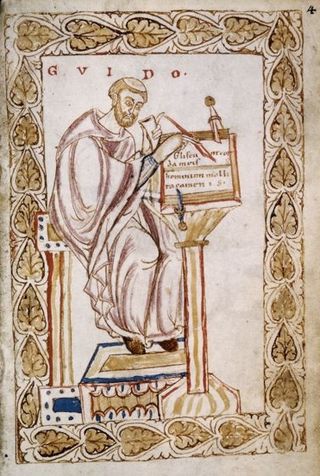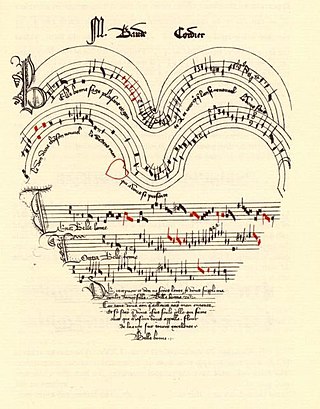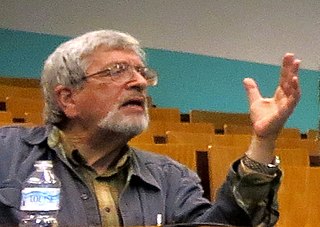Related Research Articles
Musicology is the scholarly study of music. Musicology research combines and intersects with many fields, including psychology, sociology, acoustics, neurology, natural sciences, formal sciences and computer science.

Charles Edward Ives was an American modernist composer, actuary and businessman. Ives was among the earliest renowned American composers to achieve recognition on a global scale. His music was largely ignored during his early career, and many of his works went unperformed for many years. Later in life, the quality of his music was publicly recognized through the efforts of contemporaries like Henry Cowell and Lou Harrison, and he came to be regarded as an "American original". He was also among the first composers to engage in a systematic program of experimental music, with musical techniques including polytonality, polyrhythm, tone clusters, aleatory elements, and quarter tones. His experimentation foreshadowed many musical innovations that were later more widely adopted during the 20th century. Hence, he is often regarded as the leading American composer of art music of the 20th century.

Guido of Arezzo was an Italian music theorist and pedagogue of High medieval music. A Benedictine monk, he is regarded as the inventor—or by some, developer—of the modern staff notation that had a massive influence on the development of Western musical notation and practice. Perhaps the most significant European writer on music between Boethius and Johannes Tinctoris, after the former's De institutione musica, Guido's Micrologus was the most widely distributed medieval treatise on music.
Susan Kaye McClary is an American musicologist associated with "new musicology". Noted for her work combining musicology with feminist music criticism, McClary is professor of musicology at Case Western Reserve University.

Christoph Wolff is a German musicologist. He is best known for his works on the music, life, and period of Johann Sebastian Bach. Christoph Wolff is an emeritus professor of Harvard University, and was part of the faculty since 1976, and former director of the Bach Archive in Leipzig from 2001 to 2014.

Ars subtilior is a musical style characterized by rhythmic and notational complexity, centered on Paris, Avignon in southern France, and also in northern Spain at the end of the fourteenth century. The style also is found in the French Cypriot repertory. Often the term is used in contrast with ars nova, which applies to the musical style of the preceding period from about 1310 to about 1370; though some scholars prefer to consider ars subtilior a subcategory of the earlier style. Primary sources for ars subtilior are the Chantilly Codex, the Modena Codex, and the Turin Manuscript.
Joseph Haydn completed his Symphony No. 92 in G major, Hoboken I/92, popularly known as the Oxford Symphony, in 1789 as one of a set of three symphonies commissioned by the French Count d'Ogny. Instrumentation for the symphony is: flute, 2 oboes, 2 bassoons, 2 horns, 2 trumpets, timpani, and strings.

The American Musicological Society (AMS) is a musicological organization which researches, promotes and produces publications on music. Founded in 1934, the AMS was begun by leading American musicologists of the time, and was crucial in legitimizing musicology as a scholarly discipline.

Richard Filler Taruskin was an American musicologist and music critic who was among the leading and most prominent music historians of his generation. The breadth of his scrutiny into source material as well as musical analysis that combines sociological, cultural, and political perspectives has incited much discussion, debate and controversy. He regularly wrote music criticism for newspapers including The New York Times. He researched a wide variety of areas, but a central topic was Russian music from the 18th century to the present day. Other subjects he engaged with include the theory of performance, 15th-century music, 20th-century classical music, nationalism in music, the theory of modernism, and analysis. He is best known for his monumental survey of Western classical music, the six-volume Oxford History of Western Music. His awards include the first Noah Greenberg Award from the American Musicological Society in 1978 and the Kyoto Prize in Arts and Philosophy in 2017.
String Quartet No. 1 is a musical composition by Charles Ives. Music historian and theorist Robert P. Morgan wrote that the quartet "was Ives's first mature composition of extended length, and its extraordinary fluency gives ample evidence of his solid control of traditional musical techniques. Moreover, the work is considerably more than a facile exercise based on classical models; there are already indications of the Ives to come, in the extensive quotations and, above all, in the composer's ability to bend the form to suit the idiosyncrasies of his own musical inclinations."
Joseph Wilfred Kerman was an American musicologist and music critic. Among the leading musicologists of his generation, his 1985 book Contemplating Music: Challenges to Musicology was described by Philip Brett in The Grove Dictionary of Music and Musicians as "a defining moment in the field". He was Professor Emeritus of Musicology at the University of California, Berkeley.
Jonathan Bellman is a musicologist and pianist currently employed at the University of Northern Colorado. He is noted for his research on exoticism and music.

Claude Victor Palisca was an American musicologist. An internationally recognized authority on early music, especially opera of the Renaissance and Baroque periods, he was the Henry L. and Lucy G. Moses Professor Emeritus of Music at Yale University. Palisca is best known for co-writing the standard textbook A History of Western Music, as well as for his substantial body of work on the history of music theory in the Renaissance, reflected in his editorship of the Yale Music Theory in Translation series and in the book Humanism in Italian Renaissance Musical Thought (1985). In particular, he was the leading expert on the Florentine Camerata. His 1968 book Baroque Music in the Prentice Hall history of music series ran to three editions.
Donald Jay Grout was an American musicologist. He is best known as the author of A Short History of Opera, first published in 1947. The fourth edition was published by Columbia University Press in 2003.
Gary Alfred Tomlinson is an American musicologist and Sterling Professor of Music and Humanities at Yale University. He was formerly the Annenberg Professor in the Humanities at the University of Pennsylvania. He graduated from the University of California, Berkeley, with a Ph.D., in 1979 with thesis titled Rinuccini, Peri, Monteverdi, and the humanist heritage of opera.
Barbara Russano Hanning is an American musicologist who specializes in 16th- and 17th-century Italian music. She has also written works on the music of 18th-century France and on musical iconography.

John Kirkpatrick was an American classical pianist and music scholar, best known for championing the works of Charles Ives, Aaron Copland, Carl Ruggles, and Roy Harris. He gave the first complete public performance of Ives's Concord Sonata in 1939, which became a turning point in the composer's public recognition. Kirkpatrick played an important role in Ives scholarship, and he was leader in the Charles Ives Society. One important example is his role in the editing of Memos, which is a collection of Ives's autobiographical writings. At the time of his death Kirkpatrick was a professor emeritus at Yale University, where he had also been the curator of the Charles Ives archives.
Stephen Blum is an American scholar and musician, whose research has primarily been in ethnomusicology. He has lent a multidisciplinary approach to the writing and publication of numerous articles discussing a wide range of musical topics and ideas.

Vivian Perlis was an American musicologist and the founder and former director of Yale University's Oral History of American Music.
References
- 1 2 ORCID. "J. Peter Burkholder (0000-0003-3665-9299)". orcid.org. Retrieved 2021-01-19.
- ↑ "Burkholder, J. Peter". worldcat.org. Retrieved August 22, 2016.
- 1 2 "J. Peter Burkholder: Current: Faculty: Jacobs School of Music: Indiana University Bloomington". Jacobs School of Music. Retrieved 2021-01-23.
- ↑ "AMS Administration" . Retrieved January 19, 2021.
- ↑ "About the Society | charlesives.org". charlesives.org. Retrieved 2021-01-19.
- ↑ "Theft! A History of Music". web.law.duke.edu. Retrieved 2021-01-22.
- ↑ Burkholder, J. Peter. "Changing the Stories We Tell: Repertoires, Narratives, Materials, Goals, and Strategies in Teaching Music History - College Music Symposium". symposium.music.org. Retrieved 2021-01-19.
- ↑ "Einstein Award Winners – American Musicological Society" . Retrieved January 19, 2021.
- ↑ "IU Distinguished Professor Burkholder honored by American Musicological Society: IU News Room: Indiana University". newsinfo.iu.edu. Retrieved 2021-01-19.